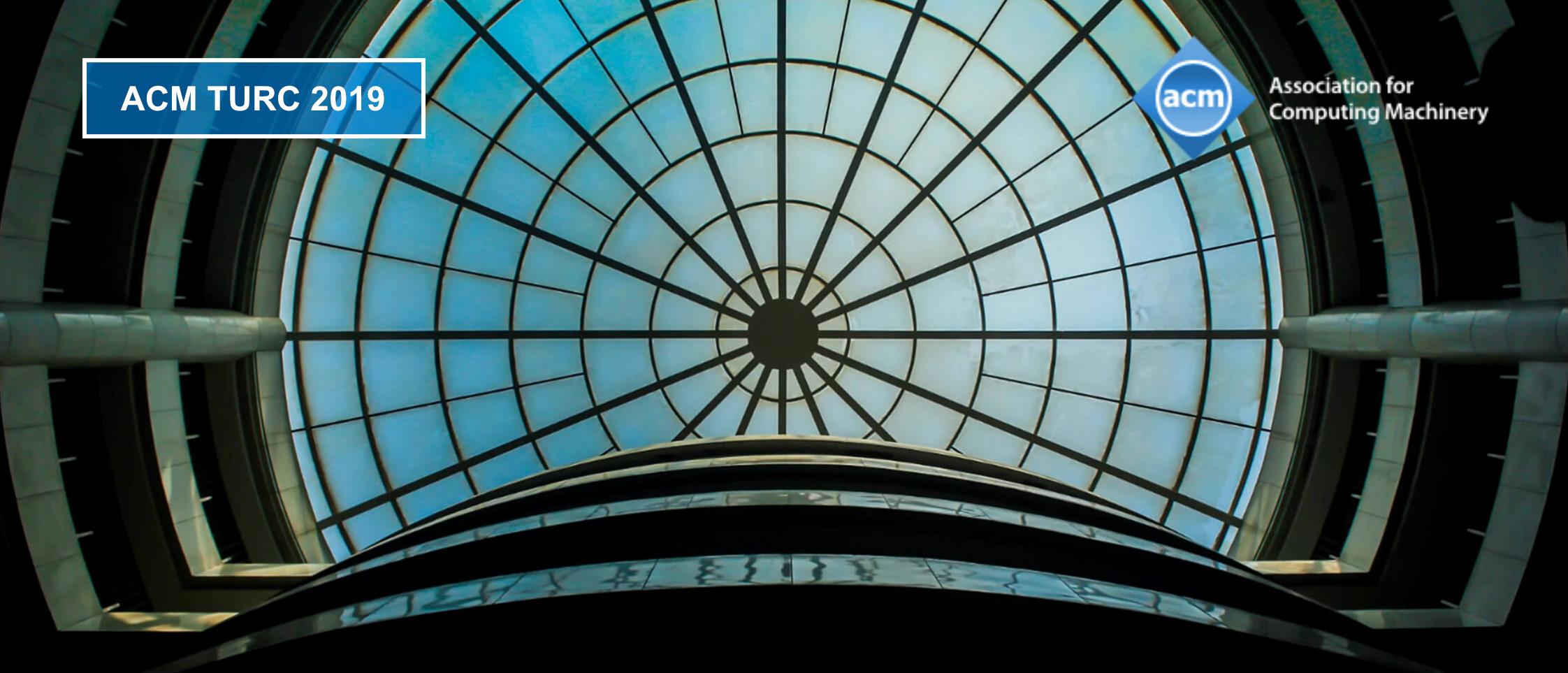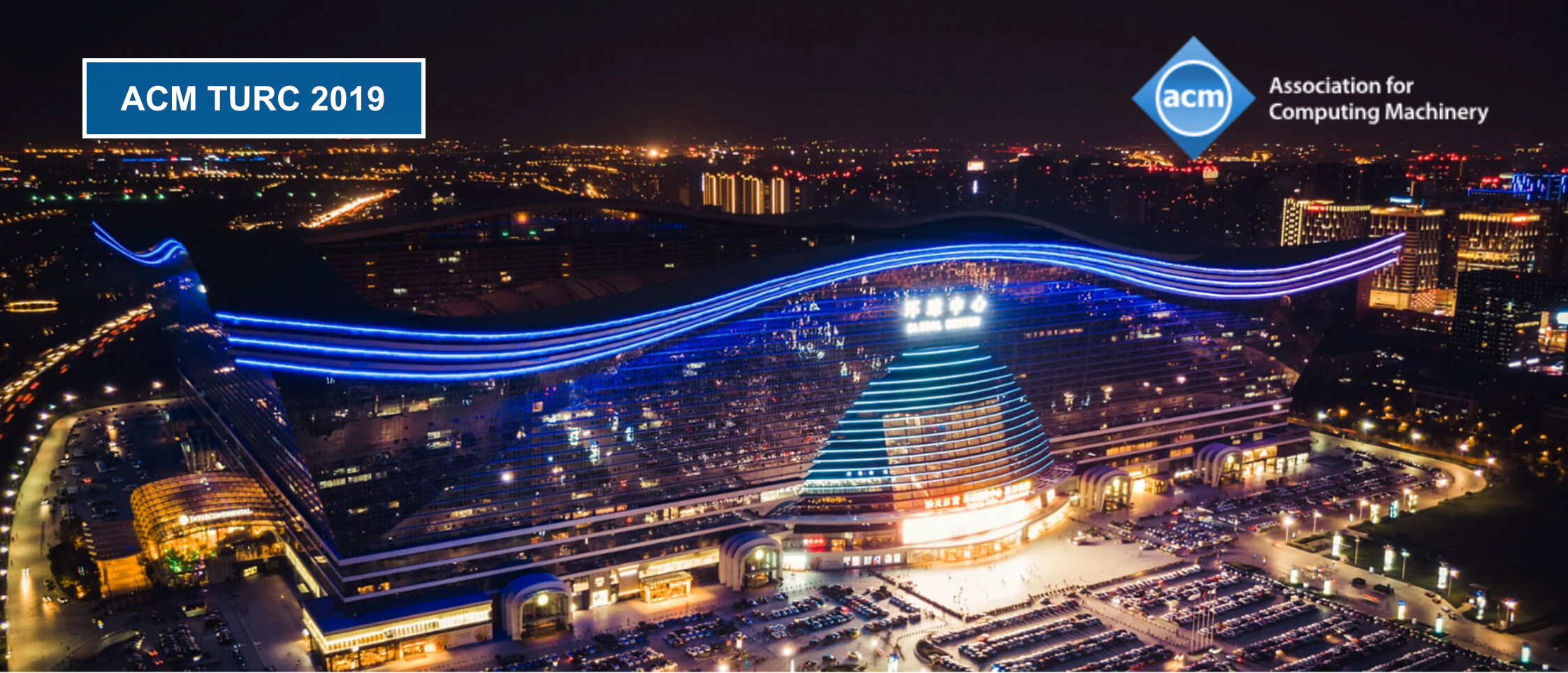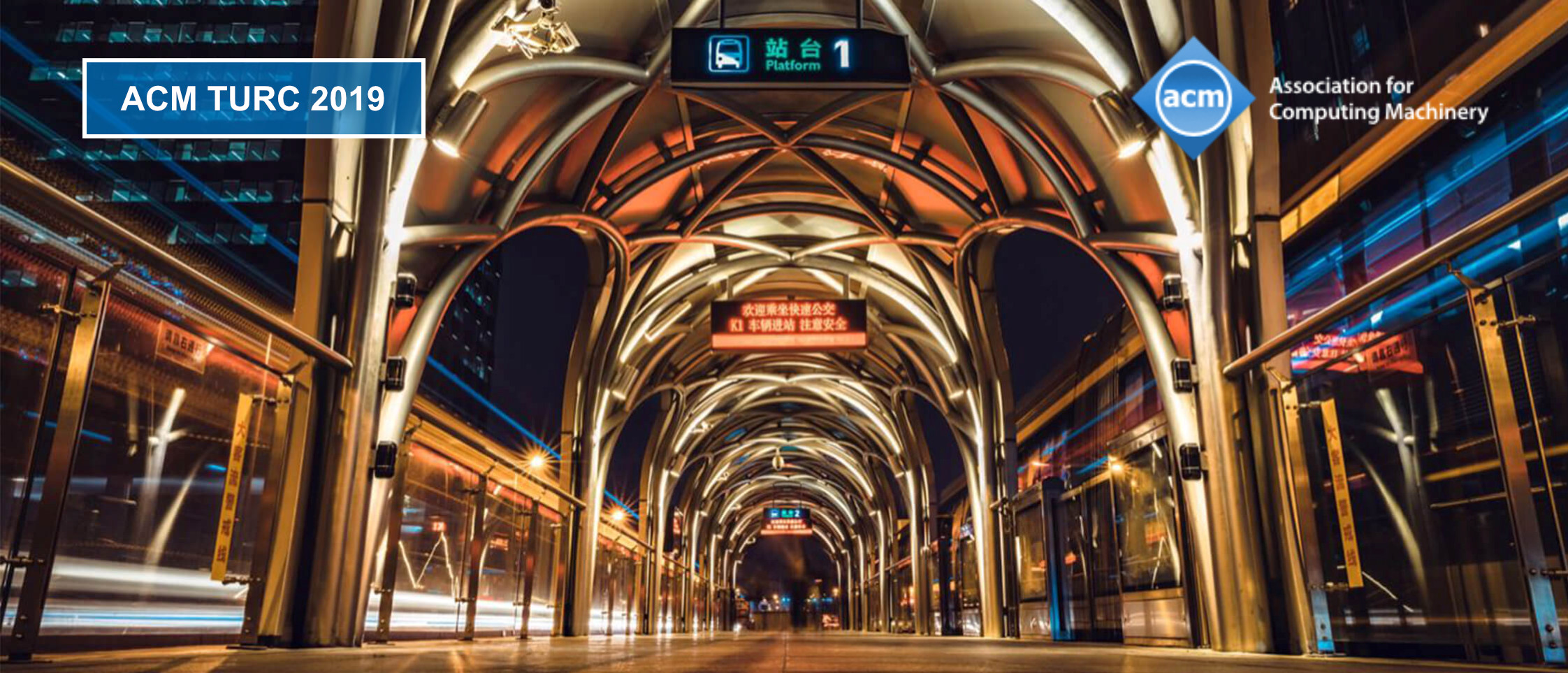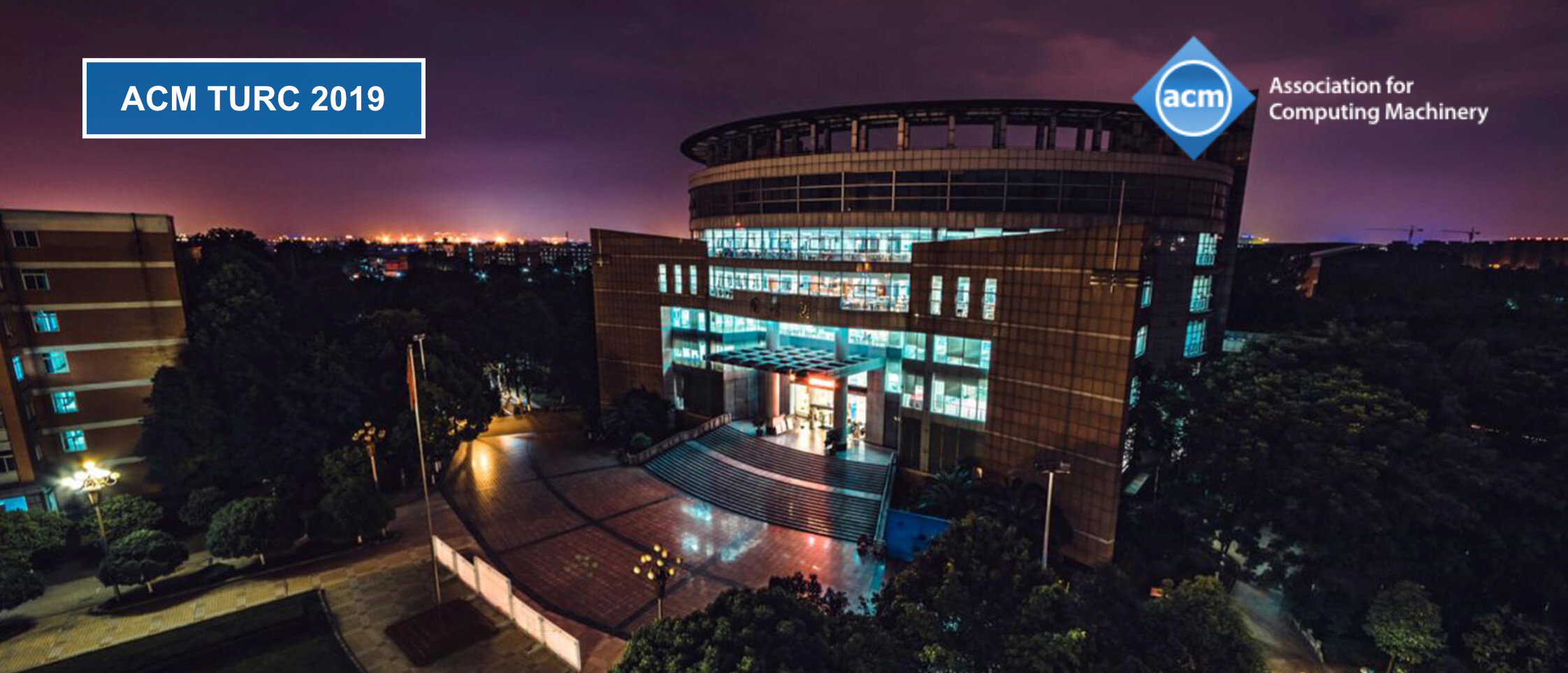ACM SIGCOMM China, approved by ACM China Council and ACM SIGCOMM on May 13th, 2016, is the official
organization of ACM SIGCOMM in China. ACM SIGCOMM China is a community for Chinese researchers who are
interested in network research, network standards, network history, and the educational aspects of
networking. ACM SIGCOMM China aims at establishing a connection between SIGCOMM and Chinese researchers,
enhancing the research in the field of data communication around China, and bringing the high-quality
activities of SIGCOMM to Chinese researchers.
The Technical Symposium of SIGCOMM China is held as one of the main technical programs of the ACM TURC
2019 conference. Sponsored by ACM SIGCOMM China, this symposium seeks papers describing significant
research contributions to the field of computer and data communication networks. We invite submissions
on a wide range of networking research, including, but not limited to:
SIGCOMM China 2019
日程安排
| 2019-05-18 : 水仙厅F3 | |
| Time | Talks |
| 14:00 - 14:20 | 开幕式(主持人:郭松涛,重庆大学) Openning Remarks (Moderator: Songtao Guo, Chongqing University) |
| 14:20- 15:10 | 特邀报告
1 Keynote 1 |
| 题目:信息物理系统与物联网:一个新兴的学科 Title: Studies on Cyber-Physical Systems (and IoT): an Emerging Academic Discipline |
|
| 演讲者:赵伟,阿联酋沙迦美利坚大学副校长 IEEE Fellow Speaker:Wei Zhao,American University of Sharjah, Chief Research Officer ( VPR) |
|
| 主持人:罗军舟,ACM
SIGCOMM中国主席 Chair: Junzhou Luo,Chair of ACM SIGCOMM China |
|
| 15:10- 15:50 | 特邀报告
2 Keynote 2 |
| 题目:拓扑路由设计如何决定Internet骨干延迟 Title:How Topology and Routing Design Determine Internet Backbone Latency |
|
| 演讲者:布拉德·卡普,英国伦敦大学学院教授、IEEE Fellow Speaker:Brad Karp,Professor of University College London (UCL) |
|
| 主持人:杨元元,美国纽约州立大学石溪分校教授、IEEE Fellow Chair: Yuanyuan Yang,Professor of SUNY at Stony Brook,IEEE Fellow |
|
| 15:50 - 16:10 | 茶歇 Tea Break |
| 16:10 - 17:20 | 圆桌论坛题目:网络研究的未来:走向新兴还是逐渐衰弱? Panel Title: The future of network studies: an emerging or diminishing field? |
| 主持人:李振华,清华大学 Moderator: Zhenhua Li, Tsinghua University |
|
| 嘉宾:赵伟、杨元元、徐明伟、叶凡、刘方明、付洁 Panelist: Wei Zhao, Yuanyuan Yang, Mingwei Xu, Fan Ye, Fangming Liu and Jie Fu |
|
| 2019-05-19 : 水仙厅F3 | |
| Time | Talks |
| 14:00- 14:50 | 特邀报告3 Keynote 3 |
| 题目:基于机器学习的智能路由AIR Title: Intelligent Routing AIR Based on Machine Learning |
|
| 演讲者:徐明伟,清华大学教授,国家杰青 Speaker:Mingwei Xu,Tsinghua University, Professor and NSFC Distingwished Young Scholars |
|
| 主持人:徐恪,清华大学教授 Chair: Ke Xu, Professor of Tsinghua University |
|
| 14:50- 15:40 | 特邀报告
4 Keynote 4 |
| 题目:一种以数据为中心的无线通信模式 Title:Towards A Data-centric Wireless Communication Paradigm |
|
| 演讲者:叶凡,美国纽约州立大学石溪分校副教授 Speaker:Fan Ye ,Associate Professor of SUNY at Stony Brook |
|
| 主持人:郭得科,国防科技大学教授 Chair: Deke Guo,Chair of National University of Defense Technology, China |
|
| 15:40 - 16:00 | 茶歇 Tea Break |
| 16:00 - 17:30 Chair: Haipeng Dai (Nanjing University) |
Paper 1:
Cooperative Offloading of Tasks with Deadlines in Mobile Cloud
Computing Authors: Xiaotong Li, Ruiting Zhou and Zongpeng Li (Wuhan University) |
| Paper 2: A Memory-Compact and Fast Sketch for
Online Tracking Heavy Hitters in a Data Stream Authors: Zhiying Tang, Qingjun Xiao and Junzhou Luo (Southeast University) |
|
| Paper 3: Exploring Federated Learning on
Battery-powered Devices Authors: Zichen Xu, Li Li and Wenting Zou (Nanchang University) |
|
| Paper 4: Popularity-Prediction-driven
Hierarchical Caching in Fog-Cloud based Radio Access Networks Authors: Xiuhua Li (Chongqing University,), Xiaofei Wang, Zhengguo Sheng, Chunqiang Hu and Victor C.M. Leung |
|
| Paper 5: UrbanEdge: Deep Learning Empowered
Edge Computing for Urban IoT Time Series Prediction Authors: Xiaochen Fan (University of Technology Sydney), Chaocan Xiang, Liangyi Gong, Xiangjian He, Chao Chen and Xiang Huang |
|
Keynote 1
 赵伟 沙迦美国大学 |
Bio:
An internationally renowned scholar, Professor Wei Zhao is currently serving the American
University of Sharjah as its Chief Research Officer (i.e., VPR). From 2008 to 2018, he
served as the eighth Rector (i.e., President) of the University of Macau. Professor Zhao
also served as the Dean of the School of Science at Rensselaer Polytechnic Institute,
Director for the Division of Computer and Network Systems in the U.S. National Science
Foundation, and Senior Associate Vice President for Research at Texas A&M University.
Professor Zhao completed his undergraduate studies in physics at Shaanxi Normal University,
China, in 1977, and received his MSc and PhD degrees in Computer and Information Sciences at
the University of Massachusetts at Amherst in 1983 and 1986, respectively.
An IEEE Fellow, Professor Zhao has made significant contributions in cyber-physical systems, distributed computing, real-time systems, computer networks, and cyberspace security. He led the effort to define research agenda of and to create the very first research funding program for cyber-physical systems, when he served as the NSF CNS Division Director in 2006. His research group has received numerous awards. Their research results have been adopted in the standard of SAFENET (Survivable Adaptable Fiber Optic Embedded Network). In 2011, he was named by the Chinese Ministry of Science and Technology as the Chief Scientist of the national 973 Internet of Things Project. Professor Zhao was awarded the Lifelong Achievement Award by the Oversea Chinese Association of Science and Technology in 2005. In 2007, he was honored with the Overseas Achievement Award by the Chinese Computer Federation. Professor Zhao has been conferred honorable doctorates by 12 universities in the world and academician of the International Eurasian Academy of Sciences. |
Keynote 2
 布拉德·卡普 伦敦大学学院 |
Bio:
Brad Karp is a Professor of Computer Systems and Networks and Head of the Systems and
Networks Research Group in the Department of Computer Science at University College London
(UCL). His research interests span computer system and network security (current work
includes resilient auditing of servers using secure CPU enclaves and the COWL system for web
browser and JavaScript security; past work includes the Wedge secure OS extensions and the
Autograph and Polygraph worm signature generation systems), large-scale distributed systems
(current work includes LDR, a traffic engineering system for ISPs that places traffic so as
to minimize delay while avoiding congestion; past work includes the Open DHT shared public
DHT service), and wireless networks (current work includes techniques for improving capacity
at the MAC and PHY layers; past work includes the GPSR and CLDP scalable geographic routing
protocols). Prior to taking up his post at UCL in late 2005, Karp held joint appointments at
Intel Research and Carnegie Mellon, and as a researcher at ICSI at UC Berkeley. Karp
received the Royal Society-Wolfson Research Merit Award in 2005 and Best Paper Awards at
USENIX ATC 1994 and 2014. He served as program co-chair for ACM SIGCOMM 2015 and ACM HotNets
2017, and has served on the steering committees for ACM SIGCOMM and HotNets. Karp is a
Member of the Board of Trustees of ICSI at UC Berkeley.
|
Keynote 3
 徐明伟 清华大学 |
Bio:
徐明伟,分别于1994和1998年在清华大学获工学学士和博士学位。现为清华大学计算机系长聘教授,国家杰出青年基金获得者,入选国家“万人”计划,担任国家重点研发计划“宽带通信与新型网络重点专项”专家,中国通信标准化协会技术管理委员会专家,中国计算机学会互联网专委会秘书长,《CCF
Transactions on Networking》期刊Managing Editor。
主要研究互联网体系结构,大规模路由和高性能路由器,研制成功国内第一台通过信息产业部IPv6高端路由器入网测试的IPv6核心路由器。制定IETF国际标准RFC 2项,国内通信行业标准2项。曾任863“中国高速信息示范网”、“高性能宽带信息网”和“三网融合演进技术与系统研究”专项总体组专家。获得国家科技进步二等奖3项,国家技术发明二等奖1项。 |
Keynote 4
 叶凡 纽约州立大学石溪分校 |
Bio:
Fan Ye received his Ph.D. from the Computer Science Department of UCLA in 2004 and then
joined IBM T. J. Watson Research Center as a Research Staff Member. Currently he is an
Associate Professor in the ECE department of Stony Brook University. His research interests
include mobile sensing platforms, systems and applications (location based services,
health), Internet-of-Things, edge computing, wireless and sensor networks. He has published
over 90 peer reviewed papers that have received over 10000 citations according to Google
Scholar. He has 26 granted/pending US and international patents/applications. He was the
co-chair for the Mobile Computing Professional Interests Community at IBM Watson for two
years. He has received NSF CAREER award, Google Faculty Research Award, IBM Research
Division Award, 5 Invention Achievement Plateau awards, Best Paper Award for International
Conference on Parallel Computing 2008. He has served as panelist for NSF and Canada, Hong
Kong government funding agencies, on program/organizing committees for conferences including
ACM Mobicom, ACM Sensys and IEEE Infocom.
|
Call for Papers: ACM TURC 2019 SIGCOMM CHINA Symposium
Submission Guidelines and Publication
Submissions should be double-blind and up to 6 pages in length (including everything) using two-column,
10-point format, and should use the required LaTex template to ensure compliance.
The submission page is https://easychair.org/conferences/?conf=acmturc2019
(please be sure to select the SIGCOMM China track as illustrated below). Detailed submission
instructions can be found in the appendix.
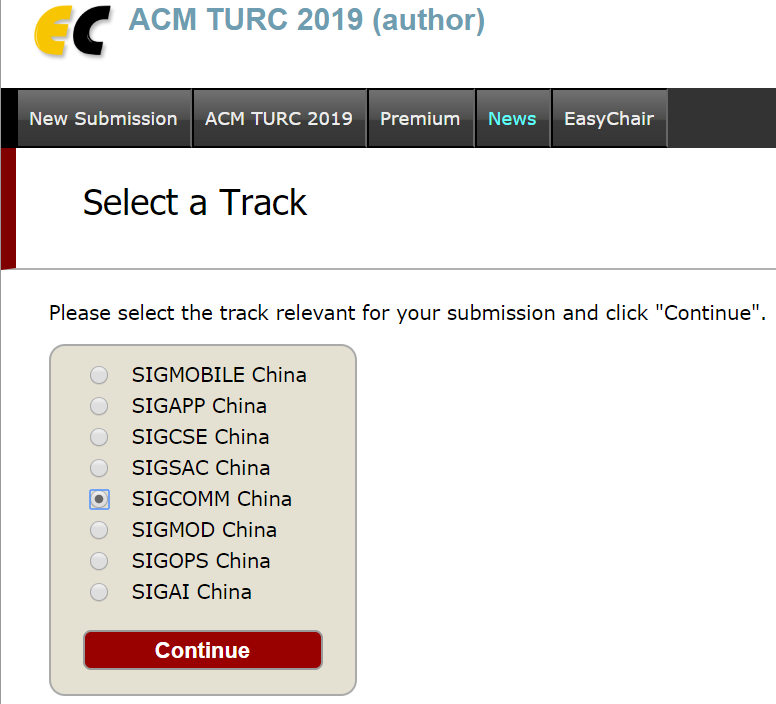
All accepted papers will be published on ACM Digital Library. One or more papers will be selected to
receive the Best Paper Award and/or Best Student Paper Award. Also, authors of selected papers have the
opportunity to submit revised and expanded version of their papers to the special issues of well-known
SCI journals such as Concurrency and Computation: Practice and Experience, Tsinghua Science and
Technology, etc.
Importance Dates
Paper Submission: March 1st, 2019
Notification: March 20th, 2019
Camera-Ready: March 27th, 2019
Organization
General Chairs
Junzhou Luo (Southeast University, China)
Yuanyuan Yang (Stony Brook University, USA)
Xiaofeng Liao (Chongqing University, China)
TPC Chairs
Ke Xu (Tsinghua University, China)
Songtao Guo (Chongqing University, China)
Zhenhua Li (Tsinghua University, China)
Publicity Chairs
Kai Liu (Chongqing University, China)
Deke Guo (National University of Defense Technology)
Haipeng Dai (Nanjing University)
TPC Members
Kaigui Bian (Peking University)
Jiannong Cao (The Hong Kong Polytechnic University)
Ming Chen (PLA University of Science and Technology)
Zhong Chen (Peking University)
Siyao Cheng (Harbin Institute of Technology)
Dezun Dong (National University of Defense Technology)
Fang Dong (Southeast University)
Hong Gao (Harbin Institute of Technology)
Ling Gao (Northwest University)
Deke Guo (National University of Defense Technology)
Kehua Guo (Central South University)
Songtao Guo (Chongqing University)
Chengchen Hu (Xi'an Jiaotong University)
Chunming Hu (Beihang University)
Weijia Jia (Shanghai Jiao Tong University)
Hongbo Jiang (Huazhong University of Science and Technology)
Dan Li (Tsinghua University)
Feng Li (Shandong University)
Jianzhong Li (Harbin Institute of Technology)
Keqiu Li (Tianjin University)
Yongkun Li (University of Science and Technology of China)
Xiangyang Li (University of Science and Technology of China)
Zhenhua Li (Tsinghua University)
Zhen Lin (Southeast University)
Fangming Liu (Huazhong University of Science and Technology)
Liang Liu (Beijing University of Posts and Telecommunications)
Juan Luo (Hunan University)
Huadong Ma (Beijing University of Posts and Telecommunications)
Jianfeng Ma (Xidian University)
Zhiguang Qin (University of Electronic Science and Technology of China)
Subin Shen (Nanjing University of Posts and Telecommunications)
Jinshu Su (National University of Defense Technology)
Chen Tian (Nanjing University)
Junfeng Wang (Xichuan University)
Xin Wang (Fudan University)
Xinbing Wang (Shanghai Jiao Tong University)
Xingwei Wang (Northeast University)
Chunming Wu (Zhejiang University)
Di Wu (Zhongshan University)
Libing Wu (Wuhan University)
Fu Xiao (Nanjing University of Posts and Telecommunications)
Gaogang Xie (Institute of Computing Technology, Chinese Academy of Sciences)
Yan Xiong (University of Science and Technology of China)
Henry Xu (City University of Hong Kong)
Jingdong Xu (Nankai University)
Panlong Yang (University of Science and Technology of China)
Heying Zhang (National University of Defense Technology)
Yuezhi Zhou (Tsinghua University)
Liang Zhou (Nanjing University of Posts and Telecommunications)
Shijie Zhou (University of Electronic Science and Technology of China)
Qingguo Zhou (Lanzhou University)
Yihua Zhu (Zhejiang University of Technology)
Paper Submission Requirements
The SIGCOMM China symposium seeks papers describing significant research contributions to the field of
computer and data communication networks. Paper submissions should report important results
substantiated by experimentation, simulation, or analysis.
Before submitting papers, please carefully read the following sections on:
Ethics Considerations
Authors must as part of the submission process attest that their work complies with all applicable
ethical standards of their home institution(s), including, but not limited to privacy policies and
policies on experiments involving humans. The PC takes a broad view of what constitutes an ethical
concern, and authors agree to be available at any time during the review process to rapidly respond to
queries from the PC chairs regarding ethical standards.
Paper Registration
Registration only requires submission of paper metadata: paper title and abstract, author names,
affiliations, contact email addresses, topics matching the subject matter of the paper, track
(experience or main), and conflicts with PC members. The paper itself does not need to be submitted at
the registration deadline. However, the paper title and abstract submitted during registration must be
complete - not placeholders - and correctly characterize the paper that will be submitted. Authors can
change the wording of their titles and abstracts for submission, but their essence should not
fundamentally change. The PC will use the information provided during registration as a basis for making
review assignments.
Both authors and PC members provide PC conflict information. The PC will review paper conflicts to
ensure the integrity of the reviewing process, adding conflicts where necessary. Broadly, we define
conflict of interest with a PC member using the following principles:
1. You are currently employed at the same institution, have been previously employed at the same
institution within the last 12 months, or are going to begin employment at the same institution.
2. You have a professional partnership as follows:
Paper Novelty
Under no circumstances should authors submit previously published work, submit the same work
simultaneously to multiple venues, or submit papers that plagiarize the work of other authors. Like
other conferences and journals, we prohibit these practices and may take action against authors who have
engaged in them. In some cases, the program committee may share information about submitted papers with
other conference chairs and journal editors to ensure the integrity of papers under consideration. If
the PC discovers a violation of these principles, sanctions may include, but are not limited to,
contacting the institutions of the authors and publicizing the details of the case. Papers accompanied
by nondisclosure agreement requests will not be considered for publication, nor ever disclosed.
Paper Anonymity
All submitted papers will be judged based on their quality and relevance through double-blind reviewing,
where the identities of the authors are withheld from the reviewers. As an author, you are required to
make a good-faith effort to preserve the anonymity of your submission, while at the same time allowing
the reader to fully grasp the context of related past work, including your own. Common sense and careful
writing will go a long way towards preserving anonymity. Minimally, please take the following steps when
preparing your submission:
Paper Formatting
All submissions must obey the following formatting requirements. Your goal as an author is to produce a
clearly readable submission within these constraints.
Before final submission, you are expected to make sure that your paper complies with these requirements.
Authors are strongly discouraged from violating the formatting requirements with the aim of including
additional material: submissions that violate the formatting requirements may not be reviewed.
Paper Acceptance
The PC will notify authors of acceptance/rejection decisions by March 20th, 2019. Authors of accepted
papers should immediately take actions addressing comments raised by the reviewers and the PC meeting
after notification. Some papers may be shepherded by members of the PC. After acceptance, substantive
changes to paper titles require approval by the PC chairs. Only in exceptional circumstances should
authors change their author list, and only with the approval of the PC chairs. Authors of accepted
papers will also need to sign an ACM copyright release form. Electronic copies of the camera-ready
papers will be published on the conference Web site before the conference, unless authors specifically
request otherwise. All rejected papers will be treated as permanently confidential.
